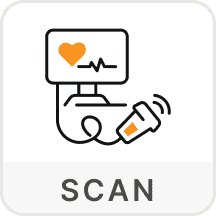 Clinic Location Select City
Clinic Location Select City 
 SCAN
SCANSCAN

Both
For all age group
About the test
ECHO
What is ECHO?
ECHO is a non-invasive diagnostic test that uses high-frequency sound waves (ultrasound) to create detailed images of the heart. The test is performed by a professional who places a small device called a transducer on your chest. The transducer emits sound waves that bounce off the heart and create echoes. These echoes are picked up by a probe, further converting into moving images on a monitor.
This allows your doctor to examine the structure and function of your heart, including the size and shape of the heart chambers, the thickness and movement of the heart walls, and the performance of the heart valves. This also detects any abnormalities in blood flow and diagnoses various heart conditions, such as valve disorders, congenital heart defects, and cardiomyopathy. This helps to evaluate the effectiveness of treatments for heart conditions and monitor the heart's response to medication.
How to Prepare for ECHO?
Do's:
- Wear comfortable, loose-fitting clothing allowing easy access to your chest area.
- Inform your doctor about any medications you are currently taking, as some may need to be temporarily stopped before the test.
- Inform the doctor about your medical history and bring the reports of any previous test results.
- Follow instructions provided by your doctor regarding eating or drinking before the test.
Don'ts:
- Don’t apply any lotion, oil, or powder to your chest area on the day of the test.
- Don’t smoke or consume caffeine on the day of the test, which may affect your heart rate and blood pressure.
- Don’t wear any jewellery or accessories.
- Don’t engage in strenuous physical activities or exercise on the day of the test.
Why is ECHO Recommended?
Your doctor may recommend an ECHO test for several reasons, including:
- Evaluating the overall function of the heart and its chambers.
- Assessing the pumping function of your heart.
- Diagnosing and monitoring congenital heart defects.
- Assessing the severity of heart valve problems, such as stenosis or regurgitation.
- Investigating the cause of symptoms such as chest pain, shortness of breath, or palpitations.
- Detecting the presence of fluid around the heart (pericardial effusion).
- Identifying blood clots or tumours in the heart.
- Evaluating the risk of heart complications before a major surgery.
